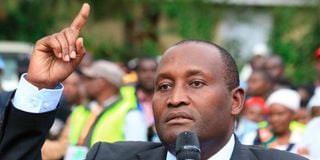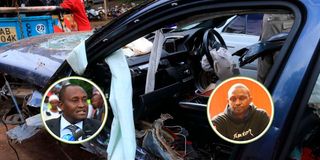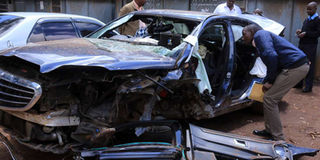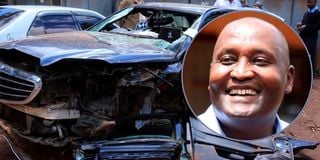
The late former Nyeri Governor Wahome Gakuru.
Months before he died in a tragic road accident, Nyeri Governor Wahome Gakuru was a troubled man who feared for his life, witnesses told a court.
Testimony during a public inquest revealed that the governor became increasingly paranoid after the 2017 general election.
The inquest heard that the governor was particularly cautious about where he ate and drank.
While campaigning, he deliberately avoided eating at large hotels, opting instead for local kiosks. This was out of fear of being poisoned, as he believed it would be harder for his enemies to work with small vendors.
His nephew, Simon Waruru, testified that the governor was meticulous about his surroundings when it came to food and drink, often pretending to drink tea in his office without actually consuming it. At home, he only trusted his personal chef to prepare his meals.

The vehicle of former Nyeri Governor the late Wahome Gakuru (inset, left). Inset (right): The former governor's driver Samson Kinyanyui Wanyaga.
“He told me that many people would not mind putting something in his tea. When we were with him, he would not go to the established hotels, he would only pop up in random kiosks for tea and mandazi,” said Mr Waruru.
He was suspicious of his surroundings and insisted that no one enter his home without his express permission.
On several occasions, the court heard, the governor summoned his head of security, Josephat Mwangi Maina, alias Baba Maina, whenever he found strangers in his house.
On one occasion, Mr Waruru said the governor had a premonition of his death.
“He gave an example of how drivers can be used to kill someone. He complained about how he was assigned driver (Samuel) Kinyanjui,” Dr Gakuru’s nephew told the court.
In the three months before his death, the governor was driven by three drivers. The first driver was inherited from the previous regime; the second was a police driver; and the third was Mr Kinyanjui, who initially worked for the governor's estranged wife, Catherine Kirumba Karemu.
Mr Kinyanjui told the court that he was assigned to the governor's team after Baba Maina recommended him to the Chief of Staff, Paul Wambugu.
The driver described a strained relationship with the governor, saying Dr Gakuru never spoke to him.
He only gave instructions through gestures. On two occasions, the governor even took over the vehicle. One such instance occurred near the Holy Family Basilica in Nairobi, where the governor abruptly ordered him to stop.
The court was also told that the governor had a disagreement with his running mate – Kinyua Kimuri.
It was said that Mr Kimuri wanted to be the governor's political advisor but Dr Gakuru wanted him to be the CEC for Water and Environment.
As a result, the court heard, Mr Kimuri held a meeting with some members of the campaign team who were angry at the way the governor had formed his government.
A video clip presented to the governor confirmed the meeting, but Magistrate Alfred Kibiru dismissed it in his ruling during the inquest, saying it was never presented as evidence in court.
Upon assuming office in August 2017, the governor had launched a forensic audit of the county's finances, focusing on alleged fraudulent procurement and fictitious pending bills from the tenure of his predecessor, Governor Nderitu Gachagua.
Nderitu Gachagua died in office in February 2017.
Baba Maina testified that Gakuru's actions had unsettled people associated with the previous administration. Dr Gakuru's nephew Mr Waruru corroborated this, telling the court that people like former deputy president Rigathi Gachagua (then Mathira MP and brother of Nderitu Gachagua) opposed the audit.

The late Nyeri Governor Wahome Gakuru's vehicle at Makuyu Police Station. It was involved in an accident that killed the governor on November 7, 2017 at Kabati along the Thika-Sagana highway in Murang'a County. On November 16, 2017, the DPP stopped the prosecution of Dr Gakuru's driver Samuel Kinyanjui over the accident.
“The governor would tell me that people like Mr Rigathi would not want the audit done saying he was an interested party in the last regime,” he told the court.
The testimonies later prompted the court to summon Governor Kahiga, Mr Gachagua, Chief of Staff Wambugu and County Secretary Benjamin Gachichio following an application by Dr Gakuru's family.
The family wanted Mr Kahiga to clarify a statement he made during the requiem mass.
They also asked the court to summon Mr Gachagua, saying he was a person of interest in the controversial exam.
But the High Court quashed the summons, saying the presiding magistrate had issued it irregularly and that the four government officials would not be useful to the inquest.
The four had told the court that they had heard about the accident from the media, like everyone else. They also said that none of the witnesses had mentioned them.
Besides the four, the court also summoned Mr Martin Nyuguto, the head of homicide at the Directorate of Criminal Investigations (DCI), after Mr Waruru testified that the death may have been premeditated.
He said Mr Nyuguto had told him on several occasions that the governor had been murdered and that they were completing their investigations. However, Mr Nyuguto became evasive and stopped taking his calls.
Mr Waruru told the inquest that so much had been left out, noting that not everyone who was with the governor had recorded statements.
“There was also the audit team, politicians in the disturbing clip sent to the governor, those who assigned drivers and his personal chef at home. I had three sessions with Mr Nyuguto and his team. I gave him the names,” he said.
But Mr Nyuguto never appeared at the inquest, despite being summoned.
The failed summonses led the family to abandon the case. The magistrate's court had initially summoned the five.
But in response to an application to the High Court to review the summons, the prosecution said the five witnesses were not needed for the inquest.
But perhaps the most shocking revelation during the inquest came from Baba Maina, the governor's security chief, who was exposed as a police imposter.
He admitted to being a Class 7 dropout, but claimed that Dr Gakuru trusted him implicitly. His role as head of security, despite his lack of qualifications, stunned the court.
Witnesses recounted how he falsely presented himself as a Senior Superintendent of Police (SSP) and even claimed to be the DCI in Machakos County.
Mr Waruru testified that Baba Maina gave orders to police officers, even summoning the regional police commissioner to the governor's residence.
The governor's security team had reported Baba Maina's fraud to their superiors, but no action was taken.
In an interview with Nation.Africa, Mr Kahiga, the Nyeri governor, admitted that he only found out about Maina's fraudulent status after the accident.
“We were shocked. It wasn’t until the DCI informed us that we learned he was an imposter. That was Governor Gakuru’s choice, and how he ended up there, we don’t know,” said Mr Kahiga.
Nation.Africa later contacted the Office of the Director of Public Prosecutions (ODPP) to ask why the office had not seen fit to investigate allegations that Josephat Mwangi Maina, alias Baba Maina, was a police imposter.
The inquiry also asked why the county government's chief of staff had not been questioned about the matter.
In its response, the ODPP stated: “The issue of concern raised by Waruru Ndegwa regarding the security setup of the late governor, especially Baba Maina, who, although said to be a senior police officer, turned out to be an imposter, was not investigated. No evidence was provided to suggest that the security of the deceased was compromised or that it was a factor in the occurrence of the accident.”
Baba Maina faced a backlash from Gakuru's family after the accident. He was accused of prioritising the retrieval of the governor's jacket, which contained cash and documents, over rescuing him from the wreckage.
Bodyguard Ahmed Khaib, one of the occupants of the ill-fated Mercedes Benz, recalled seeing him with the jacket: "Instead of helping, he went for the money. It was painful to watch.
Baba Maina defended himself, saying he had given the jacket to Ms Karemu, Gakuru's estranged wife, in an attempt to reconcile the couple.
The inquest also shed light on Governor Gakuru's private life. Ms Karemu, who is now Kenya's High Commissioner in London, gave evidence about their divorce proceedings. The governor had filed for divorce on the grounds of cruelty.
She revealed that she had fallen out with her husband, who had filed for divorce in the Milimani courts.
The public inquest heard that Dr Gakuru had separated from his wife in 2013 and the two had been living separately since 2008 and the divorce had not been finalised at the time of his death.
The inquest heard that the governor had also sought an injunction to stop his wife from disturbing his peace.

The vehicle of the late former Nyeri Governor Wahome Gakuru (inset), that crashed at Kabati on the Thika-Sagana highway in Murang'a County on November 7, 2017.
Under cross-examination, she denied allegations that she might have been involved in a plot to kill the governor because their marriage was on the rocks.
In its verdict during the inquest, the court dismissed all speculation about the governor's private life.
The inquest heard various theories that attempted to link other actors to the accident, but no concrete evidence was presented to the court to prove that the accident was planned.
“Even attempts to connect the estranged wife of the deceased, Ms Karemu, with the death, turned out speculative without concrete evidence,” he said.
Six months after the court ruling, the family has expressed dissatisfaction with the handling of the investigation.
The ODPP has also yet to press charges against the governor's driver.
“Someone told me they wanted to manage the situation by setting up an inquest. An inquest is where everyone comes in, makes their statements, and it drags on. It buys time, calms things down, but in the end, nothing comes out of it. And that’s exactly what happened; there’s never been a proper investigation into the governor’s death,” said Mr Waruru, Dr Gakuru’s nephew.
He expressed frustration at the prosecution's refusal to call the witnesses it had summoned, arguing that they should have testified instead of allowing speculation to continue.
He also questioned why the ODPP, which is supposed to act on behalf of the complainants, later informed the court that five government officials who had been summoned were not crucial to the inquest.
“It would have been more transparent for those involved to come forward and share their testimony. Unfortunately, their absence led to a growing sense that they were avoiding the truth. What the family and the people of Nyeri wanted was simply clarity about the circumstances surrounding the death of a visionary leader who had served the region,” Mr Waruru said.
Initially, Mr Waruru believed it was an accident like any other, but his view changed when the head of the DCI Homicide Division informed him that preliminary investigations suggested it was an assassination.
“Mr Nyuguto as the head of the DCI Homicide Department, must have said that for a reason. He promised to do a thorough investigation, but then he went quiet on me,” Mr Waruru recalled.
He expressed his disbelief that the people in the clip threatening the governor had never recorded any statements. A witness who had appeared at the accident scene and spoken to the media never testified at the inquest.
“It looked like something that was planned,” Mr Waruru said.
In September 2021, the inquest was adjourned as the prosecution awaited the testimony of a German expert from DT Dobie, who had reportedly inspected the car after the accident.
However, the expert never appeared in court. Instead, Paul Karung'o, a senior forensic crime scene investigator from Kasarani Police Station, testified that he had prepared a report based on notes taken during the expert's inspection. In an interview, Dr Gakuru's family lawyer explained the importance of the expert's testimony.
“He would have been the ideal person to speak on this matter. His expertise on the vehicle’s intricacies could have provided conclusive evidence about its condition,” she said.
The late governor's family has expressed concern about the welfare of his parents, who are reportedly ill and have received no support from the government.
“There was a time the parents were receiving Sh20,000 monthly, money contributed by the Council of Governors, with Governor Kahiga acting as the custodian. However, after the funds ran out, the family has been struggling, as most of their children remain unemployed,” a family member said.
Dr Gakuru's bodyguard, Corporal Ahmed Khaib, faces similar challenges. In the accident that killed the governor, Khaib lost his right leg below the knee.
“My life changed drastically. I initially used a prosthetic leg, but it broke, and I couldn’t afford a replacement. I had to take out a loan to buy a vehicle to help me move around,” said Khaib, a father of four.
He says his family is now entirely dependent on his wife as the main breadwinner, as most of his salary is eaten up by the financial demands of his changed lifestyle.
Khaib has since petitioned the Nyeri Labour Court for compensation from the county government.
He argues that it is unfair not to receive compensation, especially as the vehicle involved in the accident was insured.
Efforts to obtain information from Monarch Insurance Company on the insurance status of the vehicle were unsuccessful, with the company citing privacy concerns.
However, Governor Kahiga maintains that the county government is not liable for compensation.
“Bodyguards are hired by the National Police Service. Deployment doesn’t transfer responsibility from the national government. We only pay them per diem for travel, which doesn’t make them county employees,” Mr Kahiga said in an interview.
The governor's personal assistant, Albert Gakuru, has since been compensated by the county government for injuries he sustained to his left hand in the accident. The compensation was awarded after he took the matter to court.
memwende@ke.nationmedia.com






